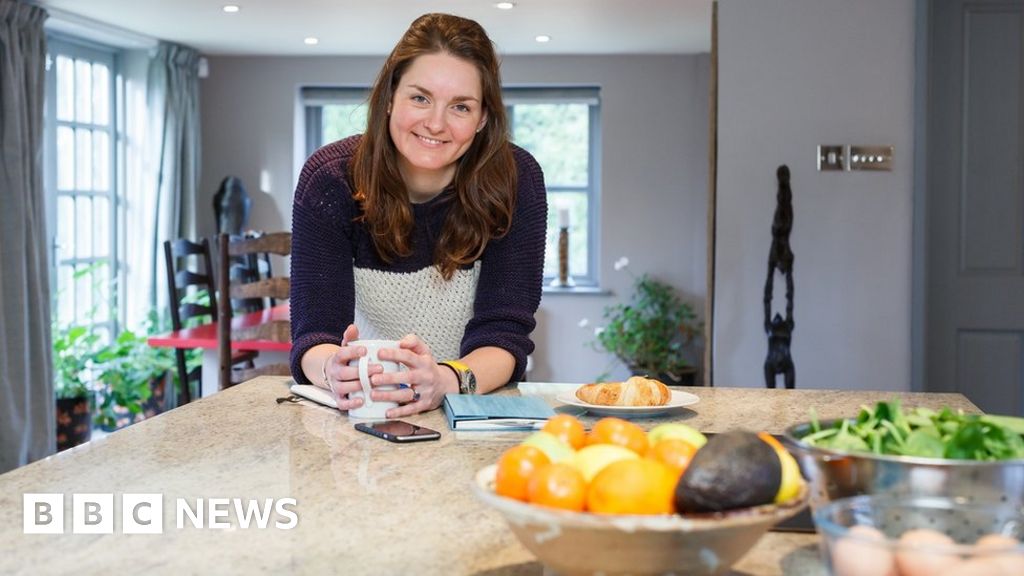Image copyright
Hattie Mauleverer
Hattie Mauleverer had to close her catering firm after lockdown hit trading
UK catering firms are among those going under as businesses struggle amid the coronavirus restrictions, industry groups have warned.
The events industry has warned of an “existential threat” to the sector, while a survey from the British Chambers of Commerce (BCC) found customer-facing businesses, including hospitality, are faring the worst.
Hattie Mauleverer used to run Top Hat Catering in London, but the business folded after the number of events dropped off a cliff after lockdown.
“It’s been absolutely devastating,” she told the BBC’s Today programme. “Eighteen years of my life has just – puff – gone.”
The local council declined to provide any rates relief for the business as people did not buy food on the the firm’s large kitchen premises.
“Although it was voluntary liquidation, it wasn’t much of a choice,” she says. “When you’re bringing in zero income it’s just unsustainable to pay rent, rates, NI [National Insurance], whatever, anything else. So, I had to make that really difficult choice.”
“So absolutely everything has had to go – the liquidators took what they wanted, and it’s gone,” she said.
‘Urgent support’ needed
Industry group the Events Industry Alliance has written to Prime Minister Boris Johnson and Chancellor Rishi Sunak warning that the sector faces an “existential threat”.
It said the decision to impose coronavirus restrictions for a further six months, coupled with many events firms being unable to get access to government support measures, meant the sector was at risk of completely failing.
The group said the events industry needed a “urgent support package” to keep it afloat.
The latest survey from the British Chambers of Commerce also warned that UK firms were struggling, with nearly half of UK companies seeing sales decrease as they endure a sustained cash crunch.
Its Quarterly Economic Survey found that business conditions remained weak in the third quarter of 2020, despite much of the economy reopening.
Image copyright
Rockport Leisure
“The light at the end of the tunnel turned out to be an oncoming train,” says Dan Davies
Rockpoint Leisure, in New Brighton, on Merseyside, employs 150 people, in its a restaurant, pub, barbers-cum-bar, and – most recently – an art gallery.
“We thought we had seen the light at the end of the tunnel, but it has turned out to be an oncoming train,” says boss Dan Davies.
The “oncoming train” Mr Davies refers to is the restriction imposed by the government last month on pub closing times.
“The 10pm curfew is killing our trade,” he says.
He said bars and restaurants faced a tough financial quarter as they were still having to employ door people and other staff, but their trading hours were being reduced by the latest lockdown curbs, including the new 10pm closing time.
“The industry has got a long hard winter coming,” he said. “A lot of businesses in our sector are not going to be open when the new year comes around.”
As well as being a BCC member, Mr Davies also sits on the board of regulatory body the Institute of Licensing, and on the board of trade body UK Hospitality
He said the business environment had been tough since lockdown, with him and his business partners having to plough more of their own money in.
“The furlough scheme and Eat Out to Help Out were of benefit to our sector, then the new restrictions were brought in,” he says.
Image copyright
PA Media
Chancellor Rishi Sunak has outlined a Winter Economy Plan for the UK
The BCC said “business conditions remain close to historic lows”, despite signs of improvement in some areas.
Its survey looked at 6,410 firms, employing more than 580,000 people across the UK, and found:
- Almost half (46%) of firms reported a decrease in UK sales, with just over a quarter (27%) reporting an increase on the previous quarter
- For firms in the services sector – which makes up the bulk of the UK economy – cash flow remains at levels comparable to the 2008-09 recession
- Two-thirds (66%) of respondents in hospitality and catering saw decreases in sales and bookings.
While the July-to-September period saw an improvement compared with the second quarter, the majority of firms continued to report decreases or no change in sales during the third quarter.
Conditions ‘exceptionally weak’
Adding to the overall gloomy picture, the BCC points out that most of its surveying took place before the prime minister’s announcement in the middle of September that a “second spike” of coronavirus had hit the UK.
It says the subsequent introduction of new national restrictions – such as those experienced by Mr Davies – and tightening local restrictions paint a concerning picture for business conditions in the fourth quarter of the year,
Suren Thiru, BCC head of economics, said: ”Our latest survey indicates that underlying economic conditions remained exceptionally weak in the third quarter.
Image copyright
JUSTIN TALLIS/Getty Images
Hospitality and catering firms have seen decreases in sales and bookings
“The manufacturing sector recorded the strongest improvements in the quarter, while consumer-focused services firms, where social distancing restricts activity, saw more limited gains.
“The persistent weakness in cash flow is concerning as it leaves firms more vulnerable to external shocks, including further restrictions.”
BCC director general Dr Adam Marshall added: ”Our findings clearly demonstrate that business conditions remain fragile in the face of uncertainty, with the prospect of a difficult winter to come.”

